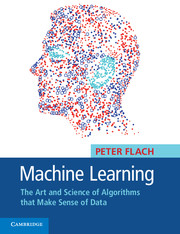Book contents
- Frontmatter
- Contents
- Preface
- Prologue: A machine learning sampler
- 1 The ingredients of machine learning
- 2 Binary classification and related tasks
- 3 Beyond binary classification
- 4 Concept learning
- 5 Tree models
- 6 Rule models
- 7 Linear models
- 8 Distance-based models
- 9 Probabilistic models
- 10 Features
- 11 Model ensembles
- 12 Machine learning experiments
- Epilogue: Where to go from here
- Important points to remember
- References
- Index
6 - Rule models
Published online by Cambridge University Press: 05 November 2012
- Frontmatter
- Contents
- Preface
- Prologue: A machine learning sampler
- 1 The ingredients of machine learning
- 2 Binary classification and related tasks
- 3 Beyond binary classification
- 4 Concept learning
- 5 Tree models
- 6 Rule models
- 7 Linear models
- 8 Distance-based models
- 9 Probabilistic models
- 10 Features
- 11 Model ensembles
- 12 Machine learning experiments
- Epilogue: Where to go from here
- Important points to remember
- References
- Index
Summary
RULE MODELS ARE the second major type of logical machine learning models. Generally speaking, they offer more flexibility than tree models: for instance, while decision tree branches are mutually exclusive, the potential overlap of rules may give additional information. This flexibility comes at a price, however: while it is very tempting to view a rule as a single, independent piece of information, this is often not adequate because of the way the rules are learned. Particularly in supervised learning, a rule model is more than just a set of rules: the specification of how the rules are to be combined to form predictions is a crucial part of the model.
There are essentially two approaches to supervised rule learning. One is inspired by decision tree learning: find a combination of literals – the body of the rule, which is what we previously called a concept – that covers a sufficiently homogeneous set of examples, and find a label to put in the head of the rule. The second approach goes in the opposite direction: first select a class you want to learn, and then find rule bodies that cover (large subsets of) the examples of that class. The first approach naturally leads to a model consisting of an ordered sequence of rules – a rule list – as will be discussed in Section 6.1. The second approach treats collections of rules as unordered rule sets and is the topic of Section 6.2.
- Type
- Chapter
- Information
- Machine LearningThe Art and Science of Algorithms that Make Sense of Data, pp. 157 - 193Publisher: Cambridge University PressPrint publication year: 2012



